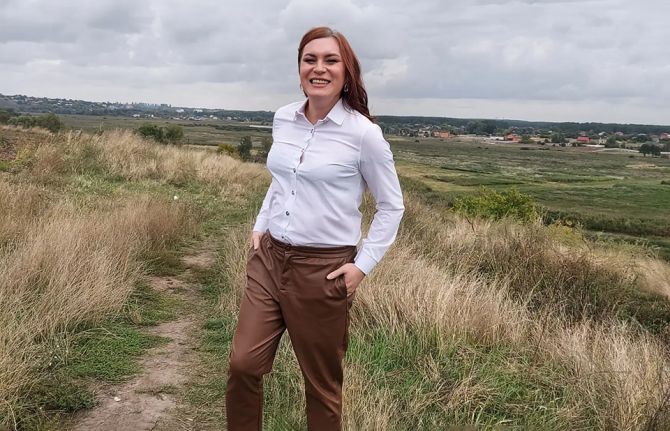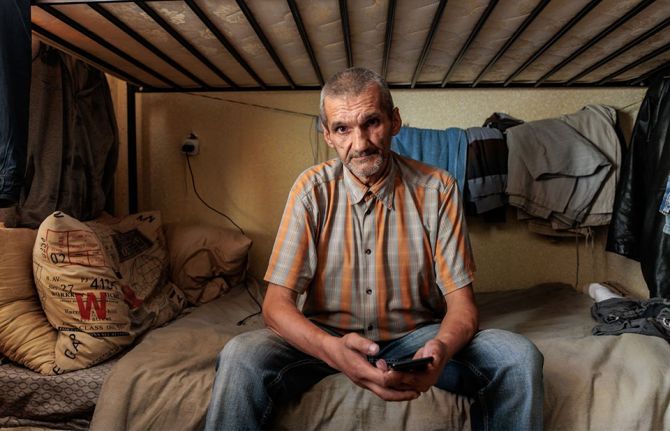

Feature Story
Ukrainian activist Anastasiia Yeva Domani talks to UNAIDS about how the transgender community is coping during the war in Ukraine
30 March 2022
30 March 2022 30 March 2022Anastasiia Yeva Domani is the Director of Cohort, an expert on the Working Group of Trans People on HIV and Health in Eastern Europe and Central Asia and a representative of the transgender community on the Ukrainian National Council on HIV/AIDS and Tuberculosis.
UNAIDS spoke to her to see how she and the wider transgender community are coping after the Russian attack on Ukraine.
Tell us a bit about yourself and the transgender community in Ukraine
I am the Director of Cohort, an organization for transgender people. Cohort has existed for about two years, although I have been an activist for more than six years. According to the Public Health Center of the Ministry of Health of Ukraine, before the war there were about 10 000 transgender people in the country, although that number is likely to be an underestimate since many transgender people are not open about their gender identity. Many only seek help during a crisis—this was the case during the COVID-19 pandemic, and is happening now, during the war. Today, we are receiving requests for help from people we have never heard from before, people who are in dire need of humanitarian, financial and medical assistance.
Ukraine created the most favourable environment for transgender people in the post-Soviet countries with regard to changing documentation and the legal and medical aspects of gender transition. It is far from perfect, but we and other organizations have done our best to improve it. Since 2019, transgender people have been represented on the Ukrainian National Council on HIV/AIDS and Tuberculosis.
What was the situation like for transgender people at the beginning of the war?
In 2016, a new clinical protocol for medical care for gender dysphoria was adopted in Ukraine, which greatly facilitated the medical part of gender transition. Thanks to it, the next year people were able to receive certificates of gender change.
However, many transgender people have yet to change all their documentation. Some people didn’t change any, some only changed a few documents and only a few changed absolutely all of them, including driver’s licences, documents on education and those that relate to military registration and enlistment. We warned about this, and now there is a war. Many transgender people didn’t realize that they needed to be deregistered at the military registration and enlistment office.
Due to martial law, men aged 18–60 years cannot leave the territory of Ukraine if they do not have permission from the military registration and enlistment office. We have a lot of non-binary people with male documentation who cannot leave.
With the outbreak of the war, many transgender people moved to western Ukraine. But, if according to your documents you are a man, you cannot leave Ukraine.
What is the situation now and what is the focus of your work?
Because of the war, in some cities there is no one left at all. Kharkiv had the largest number of transgender activists after Kyiv, including many who moved there from the occupied Luhansk and Donetsk regions in 2014. And now they must move again. We have no information about the death of any transgender people, but I think that this is only because there is no connection with some cities, such as Mariupol. Many simply did not have time to leave the city, and then it became impossible. I’m afraid that the statistics will be terrible, it just will take time to understand what happened there.
There is a lot of work going on in Odesa now—we have two Yulias there, transgender women from whom the community receives tremendous support. They took on many issues of support and funding. In Odesa, the situation is better with hormones, with medicines. We also still have a coordinator in Dnipro—she also does a lot.
Our work is now focused on financial, medical and legal assistance to transgender people who are in Ukraine, no matter where, in western Ukraine in shelters or apartments, or staying in their cities where the bombings are. Everyone has fears, but you still need to have some kind of inner core and try to fight. I don’t think everyone should leave. I understand that many people have a grudge against society, the state. For many years, decades, they lived as a victim. There is nothing to keep many of them here—there is neither work nor housing.
Who is supporting you financially?
We had projects planned for 2022, and literally on the first or second day of the war representatives of our donors said that the money could be used not only for planned projects but also for humanitarian aid. This included RFSL, Sweden, which approached this issue in the most flexible way and allowed us not only to use the project money but also to send money directly to our coordinators, so that they themselves could pay for people’s housing, travel, etc.
Then GATE (Global Action for Trans Equality) also immediately said that their funds could be used for humanitarian aid, and promised additional funds. The Public Health Alliance, through the Global Fund to Fight AIDS, Tuberculosis and Malaria, allowed changes to be made to the budget and the nature of the planned activities.
Now we will do what we can do in the context of the war, and the mobilization of the community will continue in Dnipro, Odesa, Lviv and Chernivtsi. New partners appeared that immediately responded to our needs.
I use OutRight Action funds every day for the humanitarian needs of transgender people, and also funds from LGBT Europe. There are also private donations, not large, of course, but they are also there.
What does your average day look like?
My day is filled with communication with journalists from leading publications. I also go to supermarkets for groceries and distribute them to those who need them—I have Google forms where I can see requests for help.
I administer requests for consultations with a psychologist and an endocrinologist, who continue to work in Ukraine. I receive many questions related to crossing the border and I provide information on how to communicate with the military registration and enlistment office and on which documents they need for deregistration.
There are a lot of calls, so I charge the phone five times a day. I have two Instagram accounts, two Facebooks accounts, three mail addresses, Signal, WhatsApp, etc. You need to be constantly in touch. I also need time to stand in two-hour queues at the post office—it’s such a waste of time, but people need the medicines I send. I also need to leave time to monitor the news, I need to know what is happening at the front, in the cities.
What is giving you strength?
Until my family and child left the city, I could not work in peace.
I am currently in Kyiv. In the first 10 days of the war I felt shock and fear—we literally lived from one hour to the next. Now we have got used to the danger and I’m not afraid anymore. I decided for myself, if it is destined, then so it will be. I no longer go down to the shelter: so much work, so many requests for help, calls, consultations every minute.
I was born here, in Kyiv, this is my home town. I realized that when things are bad for your country, you have to stay. I can’t run away, my conscience just won’t let me. I can’t because I know my city needs to be protected. You don’t have to be in the military to help—there is military defence, but there is also volunteer work, humanitarian aid is a lot of work.
What gives me strength? Because this is my country, I understand that everyone who can do anything, on any front, is there. We can do it everywhere, everyone can contribute, do something useful, and that gives me a sense of being needed, a sense that we can all do so much together.
Region/country
Related
 Ukraine: Keeping people in care
Ukraine: Keeping people in care

23 February 2026
 Women, HIV, and war: a triple burden
Women, HIV, and war: a triple burden

12 September 2025
 Displacement and HIV: doubly vulnerable in Ukraine
Displacement and HIV: doubly vulnerable in Ukraine

11 August 2025
